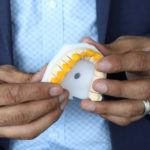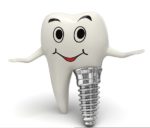Revolutionizing Dentistry: Anticipating the Release of Stem Cell Teeth

The field of dentistry has come a long way since the first toothbrush and toothpaste were invented. From the discovery of anesthesia to the development of dental implants, dentistry has seen tremendous advancements over the years. However, the latest breakthrough in dentistry is set to revolutionize the way we think about dental health. Scientists and dentists alike are eagerly anticipating the release of stem cell teeth – a technology that promises to change the face of modern dentistry forever. Stem cell teeth are a type of bioengineered tooth that can be grown from stem cells. This technology is still in its early stages, but the potential benefits are tremendous. Unlike traditional dental implants, which require drilling into the jawbone, stem cell teeth can be grown and implanted directly into the jawbone. This means that patients will no longer need to undergo painful and invasive dental procedures to replace missing teeth. Additionally, stem cell teeth have the potential to be more durable and longer-lasting than traditional dental implants, making them an attractive option for patients who want a permanent solution to their dental problems. As we await the release of this groundbreaking technology, it is clear that the future of dentistry is looking brighter than ever before.
Stem cell teeth are a revolutionary technology that is set to transform the field of dentistry. These teeth are created from stem cells, which have the potential to regenerate into any type of tissue in the body. The process involves taking stem cells from the patient’s own body and using them to grow a new tooth in a laboratory. This tooth can then be implanted into the patient’s mouth, replacing a missing or damaged tooth. Not only does this technology offer a more natural and long-lasting solution to tooth loss, but it also eliminates the need for traditional dental implants and dentures. Stem cell teeth are still in the developmental stages, but the potential for this technology is immense and could change the way we approach dental care in the future.
Advancements in dentistry have been instrumental in improving oral health, reducing pain and discomfort, and restoring smiles. The introduction of new technologies, materials, and techniques has revolutionized the practice of dentistry, making it less invasive and more comfortable for patients. One of the most promising developments in this field is the use of stem cells for regenerative dentistry. The ability to grow new teeth from stem cells could transform the way we approach dental care, allowing for permanent and natural-looking replacements for missing or damaged teeth. This breakthrough could also reduce the need for invasive procedures such as dental implants or dentures, making dental care more accessible and affordable for everyone. As dentistry continues to evolve, we can look forward to more innovative solutions that will improve our oral health and overall quality of life.
Understanding Stem Cell Teeth

Stem cell teeth are a revolutionary approach to dental health that utilizes dental stem cells to regrow natural teeth. These cells are found in the pulp of extracted teeth or baby teeth, and hold the potential to grow into a variety of different dental tissues, including dentin, cementum, and enamel. By using these cells, dentists may be able to regrow natural teeth that are just as strong and healthy as the original tooth, without the need for dentures, implants, or other more invasive dental procedures. One of the most exciting aspects of stem cell teeth is their potential to revolutionize dentistry as we know it. In the past, patients with missing teeth had limited options for restoring their smile, including bridges, dentures, and dental implants. While these solutions can be effective, they are not always ideal for every patient, and some may experience discomfort or difficulty with these treatments. With stem cell teeth, patients may be able to regrow their natural teeth, eliminating the need for these more traditional dental solutions and providing a more natural, long-lasting solution for missing teeth. As research on stem cell teeth continues, we may be on the cusp of a brand new era in dental care that could change the way we approach oral health and dental restoration forever.
Stem cell teeth refer to the concept of growing fully functional teeth using stem cells in a laboratory setting. This technology has the potential to revolutionize dentistry as we know it, offering a long-term solution to tooth loss that goes beyond the limitations of current treatments. Unlike dental implants or dentures, stem cell teeth would be completely natural and have the potential to last a lifetime. The process involves taking a small sample of a patient’s gum tissue and using it to extract stem cells, which are then cultured in a lab to form the basis of a tooth. Although the technology is still in the early stages of development, it’s a promising area of research that could transform the field of dentistry in the coming years.
The creation of stem cell teeth is an innovative process that involves the use of regenerative technology. This cutting-edge technique involves the harvesting and manipulation of adult stem cells, which are then used to create new teeth. The process begins by extracting healthy stem cells from the patient’s own body, typically from the bone marrow or adipose tissue. Once harvested, these cells are cultured in a laboratory to stimulate their growth and differentiation into teeth. The result is a completely natural, biocompatible tooth that can be implanted into the patient’s mouth to replace a missing or damaged tooth. This revolutionary approach to dentistry has the potential to transform the field and provide patients with a new level of personalized care.
The release of stem cell teeth is anticipated to revolutionize dentistry due to their numerous benefits over traditional methods. Unlike traditional methods, stem cell teeth have the ability to regenerate and repair damaged or lost teeth, making them a more efficient and long-lasting solution. Additionally, stem cell teeth can be customized to fit perfectly with the existing teeth, ensuring a more natural look and feel. Another advantage of stem cell teeth is that they minimize the risk of rejection or allergic reactions as the cells used for regeneration are from the patient’s own body. This eliminates the need for invasive surgeries and reduces the recovery time as well. Overall, stem cell teeth are a promising technology that offer numerous benefits over traditional methods, and their release is eagerly awaited by dental professionals and patients alike.
Current State of Dentistry

The current state of dentistry is constantly evolving as new technology and research emerge. From traditional dental procedures such as fillings and root canals to more advanced procedures like dental implants and orthodontics, dentistry has come a long way in recent years. However, there are still limitations to what traditional dentistry can do, especially when it comes to repairing and regenerating damaged or missing teeth. This is where stem cell dentistry comes into play. Stem cell technology has the potential to revolutionize the field of dentistry by allowing for the regeneration of damaged or missing teeth. This means that patients may no longer have to rely on traditional dental procedures that can be painful, time-consuming, and expensive. The release of stem cell teeth is highly anticipated in the field of dentistry. Stem cell teeth are made by taking stem cells from the patient’s own body and then using them to grow new teeth in a lab. These new teeth can then be implanted into the patient’s mouth, where they will integrate seamlessly with the surrounding tissue. This process has the potential to completely transform the way we think about dental procedures, making them less invasive and more effective. Stem cell teeth could also be used to treat a wide range of dental problems, including tooth decay, gum disease, and even tooth loss. Overall, the future of dentistry is looking bright with the development of stem cell technology, and we can expect to see many exciting advancements in the years to come.
Traditional methods of dental treatment have been used for decades, but they have several limitations. For example, dental fillings and crowns can only last for a certain period, and they may need to be replaced over time. Additionally, dental implants require a lot of time and effort, and they may not be suitable for everyone. Moreover, traditional methods of dental treatment often involve invasive procedures that can cause pain and discomfort to the patients. Furthermore, these methods are often expensive, and not everyone can afford them. Therefore, the development of new technologies, such as stem cell teeth, is essential to revolutionize dentistry and overcome the limitations of traditional methods.
Dental issues are ubiquitous, and despite the advancements made in dentistry, there are still many problems that dentists face in treating patients. One of the most common dental issues is tooth decay, which is caused by the buildup of plaque and bacteria on teeth. Another common problem is gum disease, which can lead to tooth loss and other health problems. Innovative solutions are required to combat these issues and improve oral health. The release of stem cell teeth promises to revolutionize dentistry by providing a solution that could regenerate damaged teeth and repair other dental issues. This new technology could potentially eliminate the need for fillings, root canals, and other invasive procedures, making dental care more accessible and affordable for everyone.
The development of alternative methods to traditional dentistry has become increasingly important in recent years. While traditional methods have been effective in treating many dental problems, they often involve invasive procedures and can be painful and time-consuming. The release of stem cell teeth represents a potential revolution in dentistry, offering a new approach that is less invasive, more efficient, and ultimately more effective. With stem cell teeth, patients can avoid many of the problems associated with traditional methods, such as discomfort, long recovery times, and the risk of complications. As such, the need for alternatives to traditional methods has never been more pressing, and it is likely that we will see more innovative solutions emerging in the years to come.
Anticipating the Release of Stem Cell Teeth

Stem cell teeth have been a topic of interest for many years. It is no secret that dental health is important to overall health and wellbeing. The idea of stem cell teeth is exciting because it offers a new way to replace missing teeth. Unlike traditional dental implants, stem cell teeth could potentially grow into natural teeth. This breakthrough in dentistry has the potential to revolutionize the industry and change the way we think about tooth loss. The release of stem cell teeth is anticipated with great excitement. This innovation in dentistry could change the lives of millions of people who suffer from missing teeth. Current dental implants often require multiple appointments, long healing times, and can be prohibitively expensive. In contrast, stem cell teeth have the potential to be a one-time procedure that is less invasive and more affordable. The development of stem cell teeth could also reduce the need for dentures, which can be uncomfortable and limit the ability to eat certain foods. Overall, the release of stem cell teeth is eagerly awaited by dental professionals, researchers, and patients alike.
Stem cell teeth research is advancing rapidly, holding the promise of revolutionizing dentistry and oral health. Researchers are working towards creating teeth using stem cells, which could eliminate the need for traditional dental implants and dentures. The technology involves growing teeth in a lab using stem cells and then implanting them into the patient’s mouth. This innovative approach can help regenerate damaged or lost teeth and improve the overall oral health of individuals. The potential benefits of stem cell teeth are vast, ranging from increased comfort and functionality to reduced risk of infection and long-term cost savings. As the research in this field continues to progress, we can anticipate a future where dental care is transformed by stem cell technology.
The field of dentistry has been eagerly anticipating the release of stem cell teeth, which could revolutionize the way we approach oral health. While there is still no official release date, researchers have made significant progress in the development of this technology. Stem cell teeth have the potential to provide a more natural and long-lasting solution to tooth loss, as they would be able to regenerate and integrate into the existing dental structure. This would be a game-changer for those who have suffered from tooth decay or trauma, as well as those who require extensive dental work. As the research continues, we remain hopeful for a future where stem cell teeth are a viable and accessible option for patients.
Stem cell teeth have the potential to revolutionize the field of dentistry by providing a natural and effective way to regenerate damaged or missing teeth. This breakthrough technology involves the use of dental stem cells, which can be extracted from a patient’s own teeth or obtained from a donor source, to stimulate the growth of new teeth. This approach not only eliminates the need for traditional dental implants or dentures but also offers a long-lasting and biocompatible solution for patients who suffer from tooth loss. The development of stem cell teeth could also lead to advancements in other areas of dentistry, such as orthodontics and periodontics, by providing new opportunities for tissue regeneration and repair. As research in this field continues to progress, the impact of stem cell teeth on the future of dentistry looks very promising.
Implications for Patients and Dentists

The implications of stem cell teeth for patients are immense and transformative. With the advent of stem cell teeth, patients will no longer need to rely on traditional dentistry methods, such as dental implants or dentures, to replace missing teeth. Instead, stem cell teeth will offer a permanent and natural solution for those who have lost their teeth due to injury, disease, or aging. Additionally, stem cell teeth will eliminate the need for ongoing dental maintenance, such as root canals or fillings, as they will be self-healing and able to regenerate. Patients will also benefit from the improved aesthetics of stem cell teeth, which will provide a more natural and aesthetically pleasing appearance than traditional dentistry methods. The implications for dentists are equally significant. With the introduction of stem cell teeth, dentists will need to adapt to new techniques and technologies to provide the best possible treatment for their patients. Dentists will need to understand the science behind stem cells and the regeneration of teeth to offer this revolutionary treatment. Additionally, dentists will need to invest in the necessary equipment and technology to perform stem cell teeth procedures, which may require significant capital expenditures. However, the benefits of offering stem cell teeth to patients will be substantial, including improved patient outcomes, increased patient satisfaction, and a competitive advantage in the dental industry. Overall, the release of stem cell teeth will be a game-changer for patients and dentists alike, revolutionizing the field of dentistry and offering a permanent and natural solution for tooth loss.
The advent of stem cell teeth will undoubtedly revolutionize dental procedures by providing a permanent solution to missing teeth, eliminating the need for dentures and dental implants. This cutting-edge technology involves using stem cells to grow natural, healthy teeth that are identical to original teeth in structure and function. The procedure is minimally invasive, making it a more comfortable alternative to traditional tooth replacement methods. Moreover, stem cell teeth reduce the risk of infection, rejection, and implant failure. With this groundbreaking advancement in dentistry, patients will be able to restore their smile and improve their overall quality of life with ease and confidence.
The development of stem cell teeth is set to revolutionize dentistry, offering numerous advantages for patients. One of the most significant benefits is the potential for teeth to be fully restored, without the need for implants or other artificial replacements. Stem cell teeth also have the potential to be more durable and longer-lasting than traditional treatments. Additionally, stem cell therapy can reduce the risk of complications associated with other dental procedures, such as infection or rejection of foreign materials. By harnessing the regenerative power of stem cells, dentistry is poised to enter a new era of personalized, minimally-invasive treatment options that offer patients a higher quality of life.
The release of stem cell teeth could have significant implications for dentists and the dental industry. With the potential to grow new teeth from stem cells, dentists may need to adapt their practices to include this new technology. Patients may also want to consider the benefits of stem cell teeth when deciding on their dental care options. The dental industry may also need to invest in new equipment and training to provide these services. Additionally, the availability of stem cell teeth could change the landscape of dental insurance and pricing. Overall, the release of stem cell teeth has the potential to revolutionize the way we approach dental care.
Stem cell teeth have the potential to revolutionize dentistry by offering a range of benefits. These teeth are superior to traditional dental implants since they can regenerate the entire tooth, including the root. This means that stem cell teeth are more durable and long-lasting than traditional implants. In addition, they may be able to prevent the need for root canal treatment, since they can regenerate dental pulp tissue. Stem cell teeth may also be less invasive than traditional implants, resulting in faster recovery times and less discomfort for patients. Overall, the potential benefits of stem cell teeth make them an exciting prospect for the future of dental care.
As the field of dentistry is rapidly evolving, it is crucial for both patients and dentists to stay informed about the latest developments. With the anticipated release of stem cell teeth, it is important for patients to understand the potential benefits of this innovative technology and how it could revolutionize the way we approach dental care. Additionally, dentists must stay up-to-date on this emerging field to provide their patients with the best possible care. By staying informed about the latest advancements in dentistry, patients and dentists can work together to ensure that everyone has access to the most effective and cutting-edge treatments available.
The discovery and development of stem cell teeth have the potential to revolutionize the field of medicine in the future. This innovative technology can help to create new teeth for patients who have lost their natural teeth due to injury or disease. In addition, it can also provide a solution for those who are not satisfied with their current dental implants or dentures. The use of stem cell teeth can potentially eliminate the need for dentures and make dental implants more effective and long-lasting. Furthermore, stem cell teeth could also be used to treat other medical conditions, such as bone loss and facial reconstruction. The future implications of stem cell teeth are vast and exciting, and it will undoubtedly change the way we approach dental care and overall healthcare.
Conclusion

In conclusion, the field of dentistry is on the brink of a revolutionary breakthrough with the anticipated release of stem cell teeth. This innovative technology has the potential to change the way we approach dental health and restore teeth to their natural state. With the ability to regenerate dental tissue and structure, stem cell teeth offer a promising solution to tooth loss and other dental issues. While there are still hurdles to overcome and further research to be conducted, the excitement and anticipation surrounding this technology are well justified. The future of dentistry is looking brighter with the potential of stem cell teeth, and we eagerly await the possibilities that it may bring.






